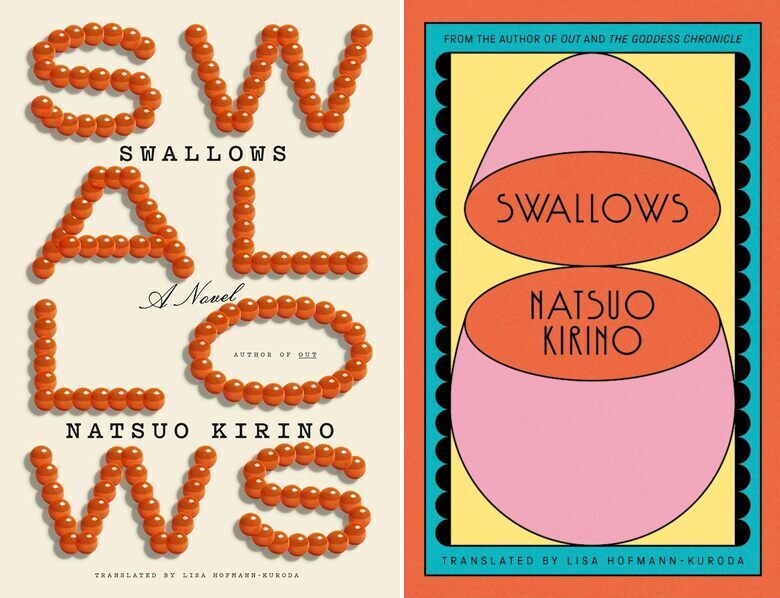Natsuo Kirino has a real gift for seeing the worst in people. Her characters cheat, steal, and murder with an apparent lack of remorse that makes them (one hopes) unrelatable for most, but they are at least sympathetic in being partially the result of their bleak environments. Kirino’s hopeless worlds of economic and social pressure suit the hard-boiled detective genre she has made her home, but with Swallows, the Japanese author attempts something different. Dispensing with thriller tropes, she tells a grounded story of human commodification that proves a sobering indictment of consumerism in Japanese society.
The young protagonist of Swallows, Riki, is one of Kirino’s struggling outsiders. Raised in a close-knit Hokkaido community but isolated in the sprawling anonymity of Tokyo, she can barely cover her living expenses as a temp. Certain she has neither the education nor the financial backing to improve her lot, Riki becomes trapped in a cycle of poverty that precludes a social life. “She never knew,” Kirino writes, “that being poor could feel this lonely, this suffocating.” Her one escape is a favorable marriage, but the eligible men she meets are even poorer than she is.
Yearning for financial security “from the depths of her being,” Riki decides to sell her eggs to a technology-assisted birth clinic. At nearly thirty, she is deemed too old for the program, but the clinic offers her a lucrative alternative: become a surrogate mother for the wealthy Motoi and Yuko Kusaoke. Promised a fee that to her seems life-changing (around US$64,000), Riki agrees to have Motoi’s sperm transplanted into her uterus. As the pregnancy progresses, however, she becomes disillusioned with the power Motoi and Yuko exert over her life. She pushes back.
Swallows arrives hot on the heels of other literary attempts to grapple with the societal expectation of motherhood.
Swallows details the circumstances leading up to Riki’s acceptance of the surrogacy and ultimate revolt. Throughout, money is both an aspirational and demoralising presence. The novel opens with the protagonist contemplating the “essence” of eggs, comparing human ovum with those eggs people consume. It soon becomes clear that the essence concerning Riki is not some spiritual marrow but market value. Swallows does not deal with literal consumption but the more abstract consumer, here represented by the would-be parents, Motoi and Yuko. Choosing a surrogate, thinks Riki, “was like chopping up a woman’s body into pieces, only in monetary terms.” As even she begins to see human eggs, and therefore human beings, as products, Swallow’s society is revealed to be one where a capitalist supply and demand extends to procreation
Swallows arrives hot on the heels of other literary attempts to grapple with the societal expectation of motherhood, including the work of authors like Mieko Kawakami, Emi Yagi and Sayaka Murata. Kirino’s novel also responds to a real Japanese society in which surrogacy still proves contentious. While not illegal, the Japan Society of Obstetrics and Gynecology (JSOG) forbids its members to conduct the procedure. Governmental bodies cite child and parental safety as ethical motivators for their censure. Critics, however, believe resistance comes from a wider social anxiety about the erosion of traditional family values and, with many domestic citizens seeking surrogates abroad, a dissolution of the Japanese self.
Unconcerned with these identity politics, Kirino’s novel focuses instead on the impact of social inequity on surrogate mothers within Japan. In Swallows, the high cost of surrogacy means only a privileged few can afford it, while the (relatively) generous compensation package for mothers entices mainly the desperate. The surrogacy procedure itself is a manifestation of a capitalist system in which the wealthy wield inordinate power over the poor. This is made clear as Motoi and Yuko begin to tighten their grip on the pregnant Riki, insisting she adopt a healthier lifestyle, not travel outside of Tokyo, and sign contracts infringing on her basic human rights.
In Swallow’s unequal world, where hard work does not guarantee a good standard of living but family wealth like Motoi’s guarantees luxury, Riki sees surrogacy as the only escape from her predicament. Like so many of Kirino’s characters, the inhuman realities of a disparate society begin to press down on her until she herself accepts inhumanity. Convinced that she has no intrinsic value beyond her ability to procreate, she is able to become what a friend dubs a “vendor of birth”, or what Riki herself calls a “baby-making machine.” With this transformation complete, mothers and babies become products, birth a transaction.
“So, who does a child belong to?” Yuko asks Motoi. “To the person,” he responds, “who wants it.” The reality in Swallows is that young life belongs to those who can afford to buy it from those who cannot afford to raise it. In a Japanese society in which a growing middle-class are deferring birth and the young working-class are getting poorer, the distinction between baby-haver and baby-owner may become common. The new horizon of assisted procreation is liberating for those with the material means, but Kirino’s novel asks us not to forget the “baby-making machines” at risk of becoming afterthoughts to the technological marvel of surrogacy. Swallows, with its unforgiving world and heavy themes, ultimately proves a thoughtful meditation on the dehumanizing underbelly of capitalist society.

